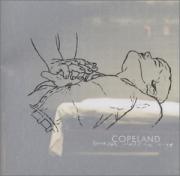
Music, as much as any art, has been used as a balm for fragile wounds. When music is used in such a manner, it rings honest and heals other cracked hearts. Sir Phillip Sidney wrote how poetry was used to relieve one's senses from the damaged world surrounding, and Beneath Medicine Tree has this same soothing effect. While Aaron Marsh struggled with the hospitalization of two close friends, these songs poured out frustration and healing. Due to this transparency, listeners can find healing as well.
Copeland takes delicate instrumentation and intimate lyrics to craft a hospital of rest without the cold, sterile environment. "Testing The Strong Ones" and "When Finally Set Free" discuss the purpose behind pain. Marsh states how this hurt is "testing the strong ones / It's scarring the beautiful ones / It's holding the loved ones one last time" ("Testing The Strong Ones"). A similar yet more progressive thought appears in "When Finally Set Free": "Feel the pain teaching us how much more we can take / Reminding us how far we've come." Pain serves as a testing ground, proving the strength of the suffering. Many lessons are only learned by walking through valleys the color of death. "Take Care" speaks of serving the hurting: "Don't lift a finger / Let me show you the only way to let this go / Don't lift a finger / Let me hold you here until the pain is all gone." Through this song we once again see the heartache involved on both sides of the hospital room, especially when Marsh adds, "Soon enough my strength will return."
Strength does return in glimpses throughout many of these songs. "She Changes Your Mind" sings of this: "It was your 'hello' that kept me hanging on every word / And your 'goodbye' that keeps me listening for your voice around each corner." By maintaining the memory, the one left behind can continue walking, even if the walking is difficult.
As much as pain is chronicled in this project, Beneath Medicine Tree contains some deliciously light notes. The songs "Coffee," "Walking Downtown" and "There Cannot be a Close Second" discuss relationships: grabbing coffee with a girl, admiring beauty, and embracing an other-worldly purity within love. The guitars, keys, and drums coincide with the light-hearted feel of these tracks, and Marsh's voice rings high and soft with pure falsetto. "When Paula Sparks" showcases the musical genius of Copeland in a well-balanced manner. It starts with a soft tempo and hints of harmony, almost ethereal. With the onset of the second chorus, the overdrive rises with heavy guitars. "When Paula Sparks" lets loose with the most energy by far, and it showcases the strength of Marsh's voice to yell with passion and still maintain his light vocals.
Throughout the lyrics one can detect snippets of spirituality. Many times the second person addressed dances between the deceased loved one and the Creator. Hidden beneath layers of beautiful imagery, the seeker can find God peeking through with a light not blinding, yet apparent. The music has a sense of depth not often seen in bands on major Christian labels, and one can't help reflect on lying beneath a tree that offers healing. Copeland's honesty, transparent as IV lines, feeds the listener with music that will help aid the healing process of a damaged society.